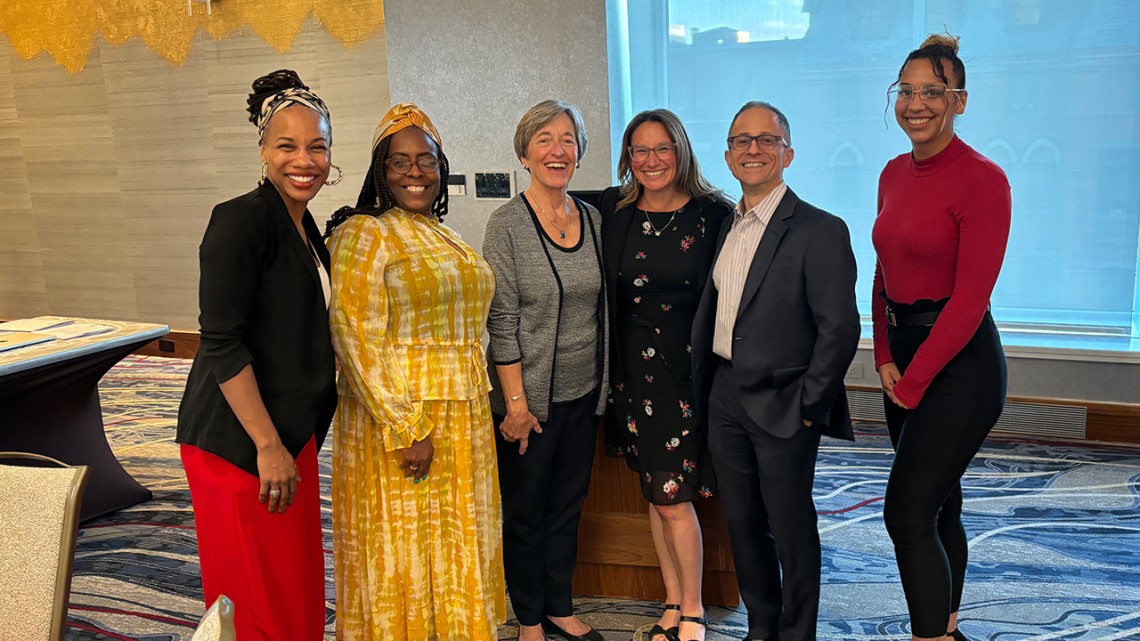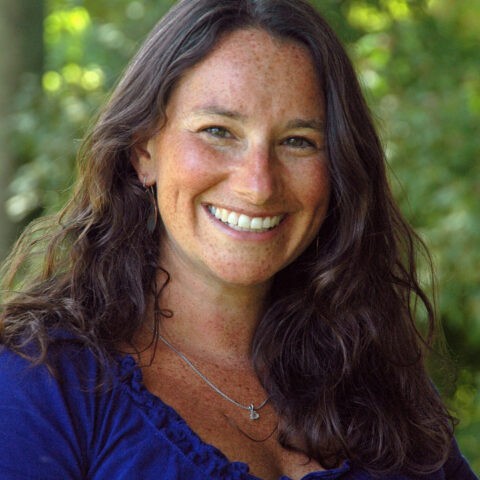
(From Left) Dr. Nia Nunn, Southside Community Center Board President, Chavon Bunch, Southside Community Center Executive Director, Susan H. Murphy ’73, PhD ’94, former vice president for student and academic services, Rebecca Morgenstern Brenner, senior lecturer at the Jeb. E. Brooks School of Public Policy, Doug Kaplan ‘88, and Kayla Matos, Southside Community Center Deputy Director at the Einhorn Center’s 2nd Annual Community Engagement Awards.
News directly from Cornell's colleges and centers
Einhorn Center honors Rebecca Morgenstern Brenner with 2024 Kaplan Fellowship
By Giles Morris
Cornell’s Einhorn Center for Community Engagement named Rebecca Morgenstern Brenner, senior lecturer at the Jeb E. Brooks School of Public Policy, recipient of the 2024 Kaplan Family Distinguished Faculty Fellowship in recognition of her work with Ithaca’s Southside Community Center to mitigate homeowner displacement resulting from newly implemented FEMA flood insurance maps.
“I am grateful to the Kaplan Family, the team at the Einhorn Center and my community partners at Southside Community Center for the chance to continue our work and make sure Southside can be more resilient and a model for community empowerment in the face of climate change,” said Brenner.
The Kaplan Fellowship is awarded each year to a Cornell faculty member who shows outstanding leadership in the area of community-engaged learning. Brenner’s course, Environmental Justice and Policy, has engaged students in partnership with the Southside Community Center to investigate and assess the impact of FEMA flood insurance requirements on displacement in Southside, an historically African American neighborhood, and to work with the community to identify anti-displacement strategies.
Brenner, who serves as a senior faculty fellow at the Cornell’s Atkinson Center for Sustainability and co-authored the book Service-Learning for Disaster Resilience; Partnerships for Social Good (Routledge, 2023), initiated the community partnership after learning that much of the Southside neighborhood would be recategorized in FEMA’s first flood map updates for Ithaca in 40 years.
The new maps, which are expected to be implemented in 2024, expand areas of the city that are considered at risk of being impacted by a “100-year flood,” with a one percent chance or greater of flooding in any given year and a one-in-four chance of flooding during the life of a 30-year mortgage.
Residents in neighborhoods like Southside, which lies along Six Mile Creek in an identified “special hazard flood zone,” will be required to purchase a federally backed mortgage on their homes in order to apply for flood insurance through the National Flood Insurance Program. Brenner’s research estimates the changes could add $7,000-$10,000 in new annual costs for homeowners.
“We know that climate change is going to affect vulnerable communities most acutely, and this is an early warning in our own backyard. You have a community that has weathered so many challenges through its history. Its residents are already facing the possibility of being priced out and might now be at a tipping point unless we do something about it,” said Brenner. “At the same time, the risk of catastrophic flooding is real. Climate resilience is about managing this kind of complexity.”
So far, multiple of Brenner’s classes have worked alongside Southside Community Center’s board and staff to address the issue. During the spring semester in 2023, her Environmental Justice and Policy class partnered with Cornell faculty in the City and Regional Planning and Landscape Architecture course, Land Use, Environmental Planning, and Urban Design Workshop that looked at flood mitigation from an urban planning lens. The classes jointly held a public forum on May 12, 2023, for regional decision makers, government officials and community stakeholders. That effort resulted in an $800,000 investment in flood mitigation for the City of Ithaca, 90% of which will be covered through a FEMA grant, to create new flood control along Six Mile, Cascadilla and Fall Creeks over the next three years.
In the interim, the pressure on homeowners to cover the costs associated with the new mortgage and insurance regulations is growing.
Southside Community Center Executive Director Chavon Bunch, a key leader in the community effort to resist displacement of longtime residents, emphasized the importance of creating lasting community-engaged learning partnerships that emphasize power-sharing, collaboration and a multimodal approach to issues.
“If the world wants a model for resiliency, we are it, but the reality is that the people who made the Southside community can’t afford to live in it anymore,” Bunch said. “This kind of service-learning partnership is an example of how the university can use its resources to help people and also to benefit from our experience. Climate resilience is just another chapter for us to write in a long history of struggle.”
Brenner said she intends to use the $10,000 Kaplan Fellowship to further the work of establishing Southside Community Center as a Resilience Hub –– defined by the Urban Sustainability Directors Network as community-serving facilities augmented to support residents, coordinate communication, distribute resources and reduce carbon pollution while enhancing quality of life–– and to pursue additional strategies to mitigate homeowner displacement. Engaged projects in two of Brenner’s Spring 2024 courses, Comparative Environmental Policy and Disasters, Vulnerability and Resilience are laying the policy groundwork for building that adaptive capacity and community resilience.
“Combatting the effects of climate change through university-community partnerships is exactly the kind of work the Einhorn Center stands for,” said Basil Safi, executive director of the Einhorn Center. “Professor Brenner’s ability to establish lasting community partnerships and ensure that community-engaged learning is a two-way street stands out.”
Giles Morris is assistant dean for communications in the Cornell Jeb E. Brooks School of Public Policy.
Media Contact
Get Cornell news delivered right to your inbox.
Subscribe


